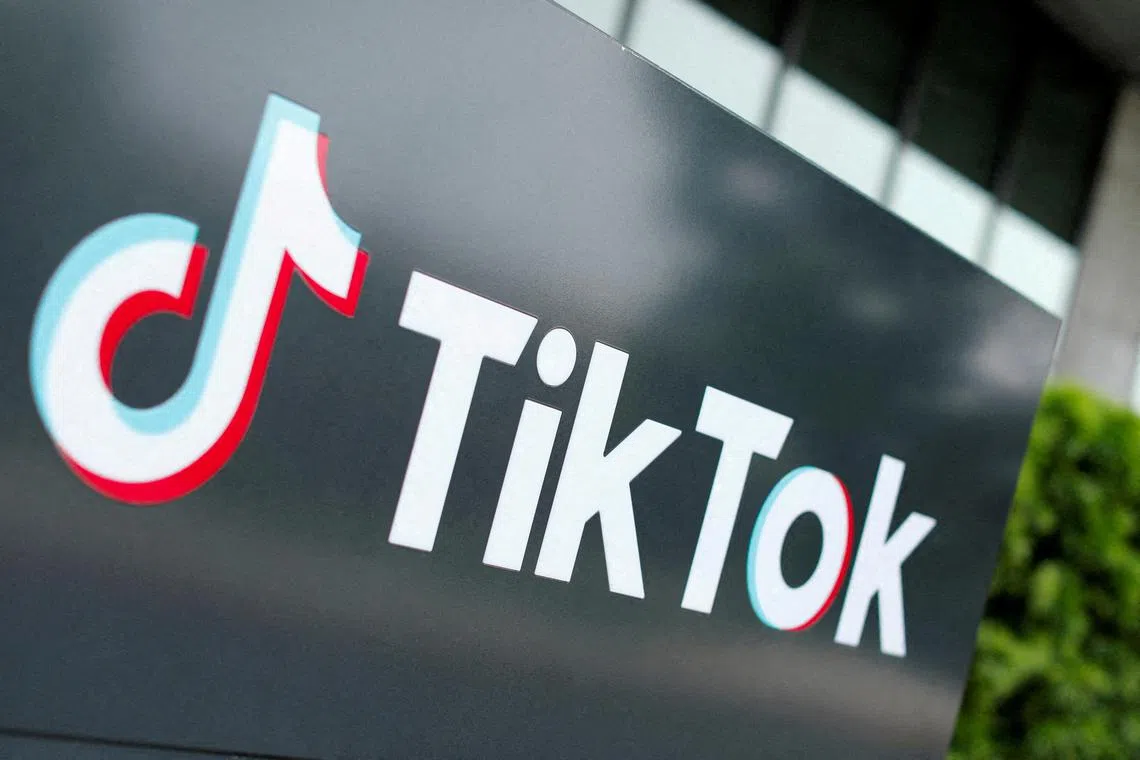US TikTok stars and marketers braced for app’s disappearance this month
Sign up now: Get ST's newsletters delivered to your inbox

TikTok will make its last legal argument in the case on Jan 10 before the Supreme Court, after losing its case in a lower court.
PHOTO: REUTERS
The impending disappearance of TikTok, one of the most popular social media apps in the United States, has sent marketers, agencies and creators racing to embrace alternatives – even if they’re not entirely convinced that TikTok will, in fact, exit the United States in January.
Marketers are shifting dollars to Instagram and amending their contracts with social media stars so they aren’t stuck paying for sponsored TikTok posts in the app’s absence. Creators are pleading with fans to follow them elsewhere while collecting their email addresses to connect on other platforms. And talent agents are telling TikTok stars to hit pause on buying a house or car for now.
“I’m just hitting 30 million followers, and 10 days from now, I might lose it all,” said Mr Joe Mele, 26, a TikTok star from Long Island, New York, who started posting jokes when he was a college freshman. “It’s a little scary.”
TikTok, which is owned by the Chinese company ByteDance, is trying to overturn a law, signed by President Joe Biden in April 2024, that calls for ByteDance to sell the app to a non-Chinese company or face a ban in the United States on Jan 19. TikTok has claimed a sale is impossible and challenged the law as unconstitutional. It will make its last legal argument in the case on Jan 10 before the Supreme Court, after losing its case in a lower court.
TikTok’s disappearance would upend the social media and marketing landscape, routing billions in advertising dollars to rival platforms like Meta’s Instagram and Google’s YouTube and scattering its 170 million monthly US users. TikTok, known for its video feed that quickly adjusts to users’ interests, has become a cultural juggernaut since 2020, giving rise to bestselling books, viral recipes, Billboard 100 hits and even a “Saturday Night Live” cast member.
“This will either be the biggest headline-making non-event in marketing history or the most shock to the system in the last decade,” said Mr Craig Brommers, chief marketing officer of the retailer American Eagle Outfitters.
Some marketing agencies and creators are taking bigger steps than others to prepare for a potential TikTok ban. Ms Vickie Segar, the founder of Village Marketing, an influencer marketing agency, said her firm’s clients were moving some advertising campaigns to Instagram from TikTok in January so their marketing wouldn’t go dark on Jan 19.
Ms Lisette Sand-Freedman, a founder of Shadow, a marketing and communications agency, recently started adding language to contracts with creators where there could be a “swopping of channels” if TikTok disappeared. So if a brand’s deal with a creator included, say, three TikTok posts and the app stopped operating in the United States, the brand would be able to switch that to posts on Instagram or another platform of its choice, she said. Many creators post short-form videos and other content to multiple platforms.
It’s a bad time to be “someone who is just so phenomenal at TikTok but sucks at Instagram”, Ms Sand-Freedman said. “I would probably not cast them in anything big right now. It just wouldn’t make any sense to cross your fingers and pray their content would work somewhere else.”
Still, many creators and marketers are balancing their very real concerns with a sense of disbelief. There has been talk of a potential TikTok ban since President-elect Donald Trump’s first term, which has “taken the wind out of the sails” of the new law, Ms Segar said.
“I think we all sort of feel in the back of our heads that it isn’t actually going to happen,” she said.
TikTok and ByteDance are private and do not publicly disclose their financials. But Mr Brian Wieser, an analyst and founder of the consulting firm Madison and Wall, estimated that TikTok brought in US$8 billion (S$10.9 billion) in US ad sales in 2024, excluding e-commerce, tipping and other ventures.
Companies can pay TikTok to run video ads or to send their posts to more viewers. They also often pay to boost posts from creators whom they contract to promote their wares. TikTok also earns a cut of sales from its robust e-commerce business, TikTok Shop, though that initiative has required significant investment from the company in the last year and a half.
Agencies that manage creators – helping link them with lucrative brand sponsorships, along with book, television and merchandise deals – have long advised their talent to diversify across social platforms.
But the TikTok ban has highlighted the broader precarity of social media businesses and in particular the creator economy, which Goldman Sachs projects to grow to US$480 billion by 2027.
“Remember when Myspace was the next big thing?” Mr Brommers said. “Remember when Vine was extremely hot? Remember Clubhouse, remember BeReal? This potential ban is a reminder to me as a marketer that things come and things go, even if this one would be on a scale that none of us have seen.”
“The brands are going to be OK,” Ms Sand-Freedman said. “It’s all those incredible nobodies who became somebodies and started making real money and building their lives from it, they’re going to be affected.” NYTIMES


